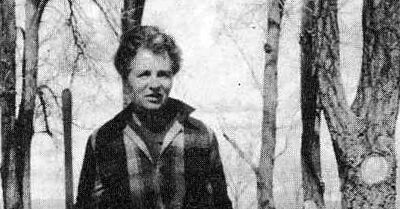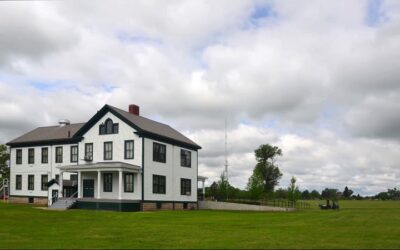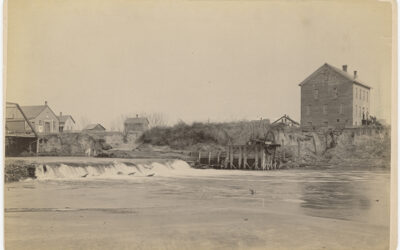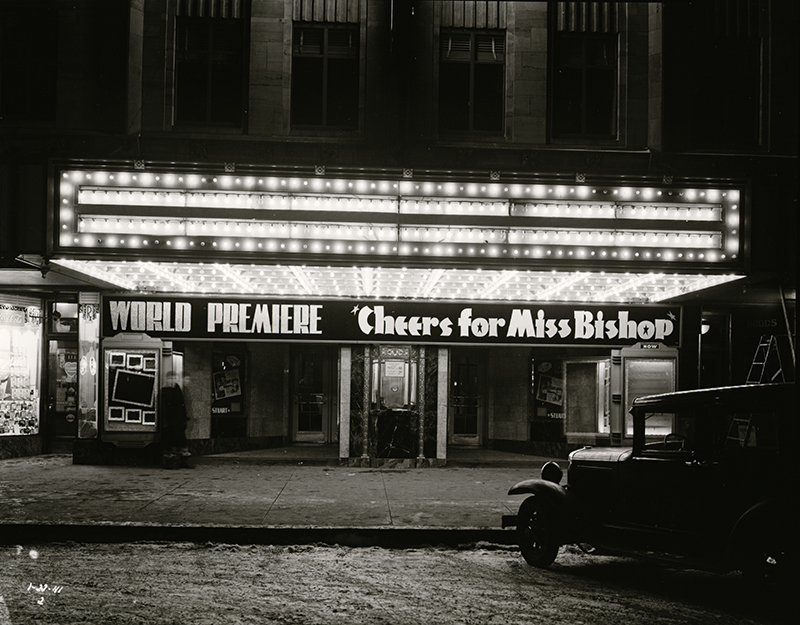
Stuart Theater, 140 N. 13th St., Lincoln, January 22, 1941. Photo by Macdonald Studio, Lincoln. History Nebraska RG2183-1941-122-2
By David L. Bristow, Editor
Many Nebraskans remember when Terms of Endearment held its world premiere in Lincoln on November 22, 1983. The movie was partly filmed in Lincoln, and Governor Bob Kerrey made headlines by dating actress Debra Winger.
But Terms of Endearment wasn’t the capital city’s first Hollywood movie premiere. The first was Cheers for Miss Bishop, based on a novel by Nebraska’s Bess Streeter Aldrich. (Omaha hosted the Boys Town world premiere in 1938, Union Pacific in 1939.)
Aldrich loved the movies. From the silent movie days onward, she tried to have her stories told on film. In 1931 her short story “The Woman Who Was Forgotten” was adapted as an early sound-era film by States Cinema Corp.
Aldrich hoped for more, but deal after deal fell through. Finally, in 1940, Aldrich traveled to Hollywood for the filming of Cheers for Miss Bishop, starring Martha Scott and William Gargan. It was, she wrote, “such a queer experience to see my characters come to life.”
Based on Aldrich’s novel Miss Bishop, the story follows the life of Ella Bishop, a woman who teaches at “Midwestern College” for more than 50 years despite several offers of marriage (a woman of her generation would usually have been required to resign her position upon marriage).
Bishop is a brilliant teacher and dedicates her life to her students. But when she is old, she loses most of her life savings during the bank holiday of 1933. At the same time, the new college president forces her to retire. Miss Bishop struggles with feelings of bitterness and fear, resentful of being cast off into an impoverished old age after a lifetime of service to others.
Unknown to Miss Bishop, former students plan a surprise for her. They return to pay public tribute and to present her with the money they have raised for her retirement.
The plot was similar to “The Woman Who Was Forgotten,” which was about a retired high school teacher. Like the 1995 movie Mr. Holland’s Opus, Aldrich’s two stories honored the teachers who make a difference in students’ lives.
On January 14, 1941, the film’s director, many of the actors, countless local dignitaries, and about 15,000 movie fans gathered in Lincoln for Cheers for Miss Bishop’s premier. Some of the movie’s scenes had even been filmed on the University of Nebraska campus.
“Hollywood gave the city the world premiere… and Lincoln gave Hollywood three big rahs and a tiger—at which Lincoln, trained in the art from years of sitting in the big university football stadium, bows not even to the fabulous movie capital,” the Nebraska State Journal boasted the next day.
In truth, Nebraskans were still enthused from the Cornhusker football team’s recent appearance in the Rose Bowl. Nebraska seemed to be hitting the big time all at once. One of the night’s funniest moments came during a live radio broadcast from a reception at the Nebraska Coliseum. When the Lincoln High School band suddenly broke into a rousing version of “There Is No Place Like Nebraska,” the KFOR crew frantically “threw switches, buried microphones… and nearly bent themselves double” to keep the song off the air.
Why? “Answer is that the tune’s copyright belongs to the American Society of Composers, Authors and Publishers, which is currently warring with Broadcast Music, Inc.”
For Bob Aldrich, Bess’s youngest son, it was strange to see his mother in an evening dress, mingling with Hollywood stars. He was used to seeing her wearing an apron, “in the kitchen turning pancakes by the dozens.”
But Bob’s mother was not intoxicated with glamour. A few months later, when she attended the New York City premier of Cheers for Miss Bishop at a packed Radio City Music Hall, she did so anonymously, and mixed with the crowd so she could hear what people were saying about the movie.
That was how Bess Streeter Aldrich did most things — quietly, without drawing attention to herself, always listening.
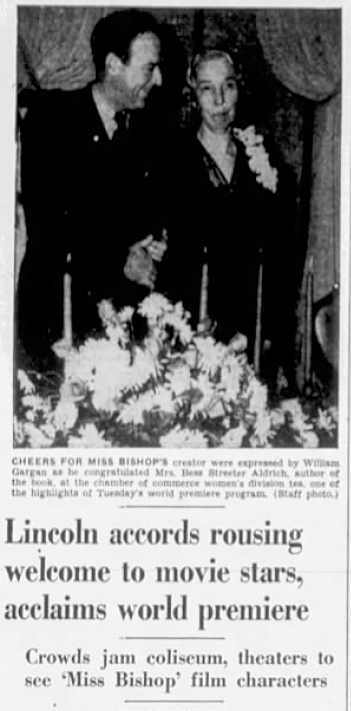
Nebraska State Journal, Jan. 15, 1941
Read more:
How Nebraska’s Bess Streeter Aldrich became a bestselling author
How Nebraska author Bess Streeter Aldrich rescued her local bank during the Great Depression
Sources:
Carol Miles Peterson, Bess Streeter Aldrich: The Dreams Are All Real (Lincoln: University of Nebraska Press, 1995), 120, 127, 179-81.
Dean Pohlenz, “Lincoln accords rousing welcome to movie stars, acclaims world premiere,” Nebraska State Journal (Lincoln), Jan. 15, 1941.
(Posted 3/13/2023)


